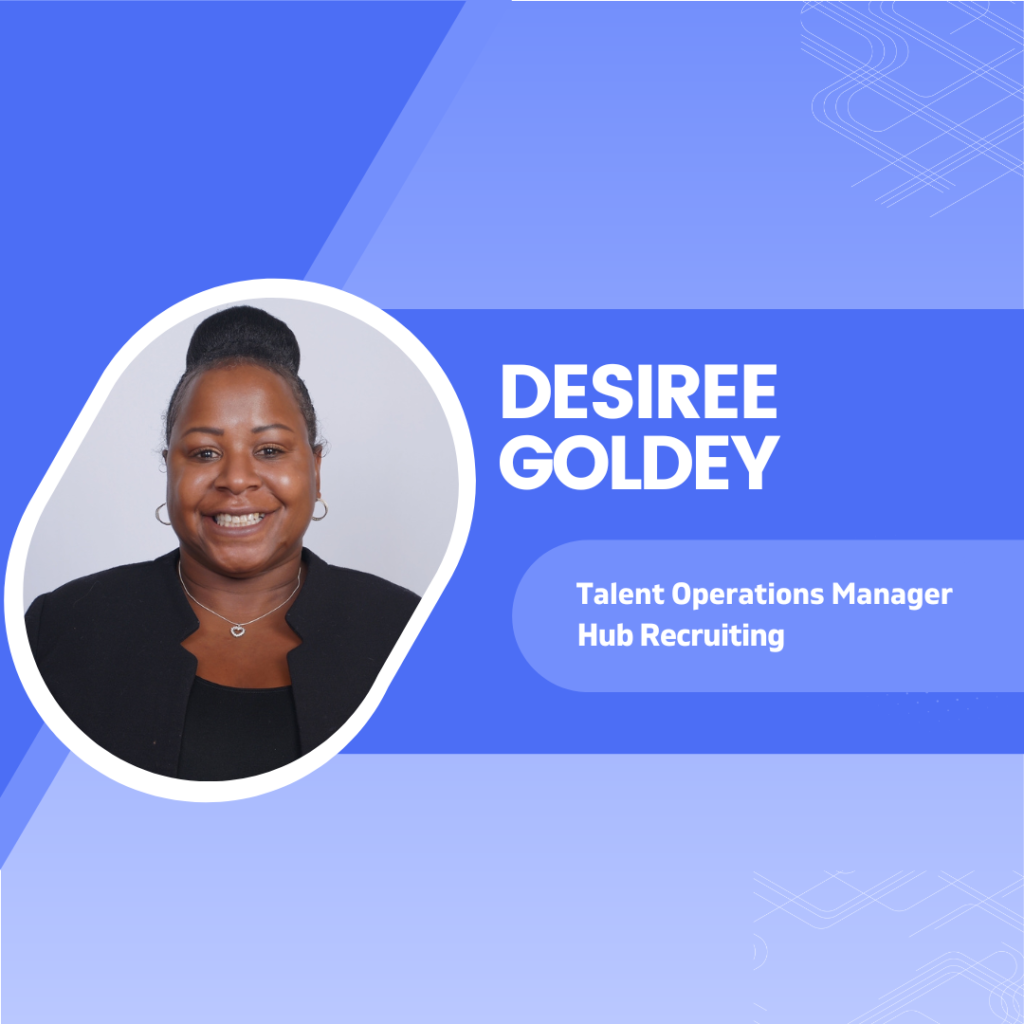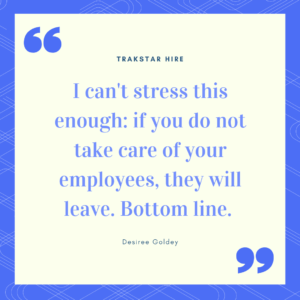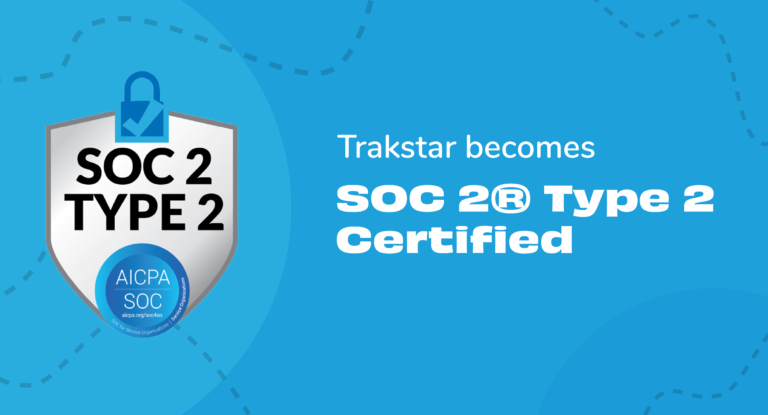Customer Q&A: Trakstar Hire & Hub Recruiting
Posted by Trakstar • October 12, 2022 • 14 min read
We had a great opportunity to share a conversation with Desiree Goldey, the Talent Operations Manager for Hub Recruiting. As a customer of Trakstar Hire, Desiree uses Hire for tracking candidates and recruiting during the ongoing war for talent. During this great Q&A, Desiree provided a lot of insight into the war for talent, and other hot topics HR professionals are closely watching.
The conversation was held with Jason Wells, a member of the Trakstar team.
An Introduction To Hub Recruiting & Desiree Goldey
Jason Wells: So, if you will start today by just giving me some background and information about Hub Recruiting and what you do with them.
Desiree Goldey: Yeah, absolutely. So, let’s start with Hub Recruiting a little bit. Hub Recruiting is an RPO. For those that don’t know, it’s recruitment process outsourcing. We work with many different clients, placing recruiting consultants in their space, working with their candidates, defining processes, streamlining processes, etc., to get them to the end goal.
The goal and the purpose of an RPO is to have flexibility and also be able to measure the ROI, right? You are placing somebody in that role, and you can measure whether they were valuable by how many hires, how much the process changed, etc.
Hub has been around since 2010. We started in Boston in a little office. We are now a global brand and have clients everywhere. We go from recruiting coordinator all the way through to full lifecycle recruiters and even have had directors of talent on-site at some of our clients.
My role at Hub has kind of morphed. I started as a recruiting consultant. I came onboard from an agency type of environment in recruiting, and realized I needed more relationship building with my candidates. I’m a huge candidate experience person. Now, because I always see processes, systems, and data. Talent operations was where I thought my best use to the company was. And that’s where I live now, in the talent operations space.

Talent Operations
Jason Wells: That was my next question. Explain talent operations to me?
Desiree Goldey: Yeah. So, it’s a new term for a lot of people. I think it’s defined by where you work, to be honest with you. But it’s really about systems, processes, and data. It’s collecting the data to be more efficient in the work that we do as a talent team. Being a recruiter advocate, looking out for your recruiter, especially in an RPO situation where I may have 40 clients and recruiters all over the place, making sure that they have what they need at their specific clients, and making sure everything is going smoothly. So, it’s a little bit of a mixed bag. But it really all goes down to system, process, and data.
How Hub Recruiting Uses Trakstar Hire
Jason Wells: So, moving ahead here a little bit, can you provide me some background as to how you currently use Trakstar Hire and how that became a necessary tool or something that you needed to incorporate into your work?
Desiree Goldey: Yeah, absolutely. So, we’re always evaluating systems. I think, you know, it’s a constant situation for us, and we’re always recommending systems to our clients. It’s just part of what we do at an RPO. Trakstar, we’ve used numerous times. I used it when I was a recruiting consultant. I just fell in love with it. I think the ease of use and the ability to move the people through the process, get feedback, you know, really make it a team effort, really have extreme candidate experience, which I told you I’m big on, was so huge for me when I was using Trakstar. I just found it so easy. I love that Trakstar is like a full, complete suite of things. It’s not just Trakstar Hire. So, I thought it was just such a valuable tool to use with my clients.
Jason Wells: Have you used Insights at all since we launched that with Hire?
Desiree Goldey: Yes, absolutely. And, again, I’m a data person. So, the analytics for me is everything. And I’ve used both tools. And both are so effective. I recommend it time and time again. I work with a lot of startups; I’m like the startup queen. So, you know, startups who don’t understand really how to use talent and how to use the data Trakstar really figured that out for me and how to explain it to them really easily. And so, it was really, really a great use and a great tool.
Jason Wells: Awesome. One thing I will mention to you, to hopefully get you excited about, is we recently released Benchmarking on Perform. It’s part of Insights. It helps clients be able to look at how they are doing against peer groups, so companies of similar sizes or in their industry. And that’s something we are currently in the works for on Hire.
Desiree Goldey: What an amazing idea, right? Because I can compare a startup to Google, but it’s not really how I should be using this data. It doesn’t really make sense to use that data across the lines. And I think having a benchmarking tool is going to make a lot of sense. So, I’m excited for it.
Jason Wells: The way I also think about it is in terms of those companies and showing value to them. For example, ATS Systems like Hire, make sure that they understand the value there. And that even after a candidate is hired, you can use some of that data to make your processes and improve those moving forward to make that tool even more and more valuable.
Desiree Goldey: Right. And this is what we always say. Just because the hire happened, doesn’t mean that you can’t look back at the data of how you got to that hire to understand or streamline your process, make your process better, all of those things. And even that is the ROI. With tools like Trakstar, I think it even helps in the benchmarking, which is going to be fantastic.
Jason Wells: Yes! Benchmarking is new to us, but it has been a game-changer so far. And definitely, we are hearing a lot about it and a lot of clients using it. So, yes, we’re excited to add it into Hire here soon.
Desiree Goldey: That’s awesome.
The Great Resignation, Hiring, and Recruiting
Jason Wells: So, with all your ability and experience around talent, a couple of things that we wanted to talk about…What companies are hearing about currently. Can you talk a little bit about the Great Resignation, as it’s been called over the past year, year and a half, that is still going on today? And how it has affected your job as a recruiter.
Desiree Goldey: So, it’s funny, I was just reading an article and posted about it on LinkedIn a little bit ago about the Great Resignation becoming the Great Regret. Like people are leaving and feeling like they left, and now they’re at a company they hate. But I still think even though the data is in those numbers, the Great Resignation was great for some people. They may have not jumped to the right place, but they found out that the place that they were at was not the perfect place for them. And they hopefully will eventually find the right place.
But what it did is create this horribly tight labor market, which is insane. And so, for a recruiter, it’s a daunting task to have all these people available, messaging you all the time. In the tech space, we keep firing recruiters, right? Laying off recruiters. So, then we have these recruiters who are still there with all that pressure on them. They’re holding 15 to 20 roles, which is insurmountable when you look at the amount of people who have resigned. Somebody told me the Great Resignation made it so much easier for recruiters. I said, I actually think it to be the opposite. I think it made it harder. Because the value proposition you have to show to those people, it’s got to be there. They are not going to jump to another company because they just left for so many reasons. If you can’t prove to them that those reasons aren’t going to happen again, they are not going to move. So, these things all change how we value and how we question candidates. It’s changed the process.
Jason Wells: Has it been harder to get enough candidates in for particular roles simply because so many people have left the workforce in general?
Desiree Goldey: Yeah, I mean, definitely the numbers change. Because everybody’s looking, and they are always looking for the big names. So, if you’re a smaller company, or a startup, you struggle right now. Because you don’t have that name brand behind you to be able to say, hey, come to such and such. They’re scooping up all those candidates really quickly. Whereas if you’re a startup, you’re struggling to say, hey, this is why you should come here. We haven’t proven anything. We have only been in business for a year. But hey, jump to us. It’s definitely a different market.
Jason Wells: Have you noticed that employee demands have gone up? Because one of the things I’ve taken from it, as much as anything, is kind of taking that power out of the employer’s hand. Saying I will work for you, but here are my expectations and what I want.
Desiree Goldey: Yeah, I think the offer is very different, right? We get to offer stage, and they are like, nope. Which I still think is one of the processes that we need to clean up. I think the offer process gets a little harder. But I also think the sales pitch gets harder. You know, if you want to work from home, and it’s not a work from home, and you want me to come in once a week, people are saying no, right?
And, you know, I think there are exceptions to the rule. People may have resigned from an extremely toxic workplace, or a racist workplace, or they were never going to get promoted. Those people, those candidates, don’t necessarily fight the good fight all the time. But I think there are so many that are fighting the good fight for what they need, that it does make it more difficult. And yes, the employer is not in control as much as they used to be. Absolutely not.
Quiet Quitting
Jason Wells: Going back to an earlier thing you said where, with the war for talent, it’s become even harder as a recruiter because of expectations from employers now regarding the talent they’re getting. How has that changed with the new big term, quiet quitting? How has quiet quitting played into this? Are employers truly concerned about this?
Desiree Goldey: Yeah. I think it started on TikTok, I believe. But I think it’s been going on forever. And I don’t believe in quiet quitting. I believe that you’re doing a job. You’re doing your job successfully, and you go to work every day, you’re doing a job. Your job should not be your life. I’m an overachiever. Not everyone is that way. If there were a bunch of overachievers at a company, we’d all be in trouble. A company might burn to the ground in competition, you know what I mean?
It just can’t happen that way. It just can’t be the truth of how we live. People have different personalities, work styles, all of those things. I do believe there is a place for a person to hit 100% of quota and be a great employee. I think people are just determining that they are not going to give their life to a company.
I don’t think employers are so worried about it. I think that they know who their performers are and who their underperformers are. And if you don’t, you should definitely work on your performance management strategy. But you do know that people come to work and do their job. I don’t believe that’s quiet quitting. I believe that’s doing your job.
Looking Ahead For Recruiting & Hiring
Jason Wells: Let’s look ahead a little bit. Where are things going a year from now, as the Great Resignation that came out of COVID slows down? Are employee demands diminishing? Are employers getting more control back?
Desiree Goldey: Yeah, what I think is that I think it eventually will even out. I don’t think this will happen until probably Q3 of 2023. I think it still is a candidate market, and it will continue to be for a while. I mean, people are just sick of it. And they’re going to demand better from employers. What I do think happens is that employers start to step up. They start to make the candidate experience better, they start to make the employee experience better. They start to bring in the tools that they need to do to be able to keep these people. Talent retention is going to be where it’s at in the future, right? And development.
If you’re not doing that, you will still be part of that company that takes on that Great Resignation, because those people will leave. And so, as we move forward, I’m hoping that companies look at this as a time to develop processes, figure out ways to retain talent, develop your talent internally, promote your talent internally, and a lot of this will stop happening.
Jason Wells: Retention, there is a key phrase that we really haven’t touched on yet. And how much you like to see that as a recruiter, which I’m guessing weighs a lot into the ROI of those positions that you fill?
Desiree Goldey: Yes, absolutely. The data about talent retention is huge, right? If I put someone in a spot and they’re gone in a month, that doesn’t hold anything. Those data points, that ROI that we got to hire, doesn’t hold any value. So, constantly looking at employee experience and development is so huge.
I can’t stress this enough: if you do not take care of your employees, they will leave. Bottom line. I mean it. And whether that’s through employee experience, whether it’s camaraderie if you’re remote, that culture piece that we kind of miss in the remote culture. Whether it’s rewarding people, whether it’s developing people, promoting people, all of these things need to happen. And I’m not saying one or the other, I’m saying they all need to happen.
I think employers are listening. I think they are hearing it.

Jason Wells: Beyond hiring, at Trakstar we have our Learn and Perform products as well. We try to talk to companies about yes, once you hire employees, you do need to spend time developing them, and then have the proper performance review system in place to retain that talent so that talent stays with you over time.
Desiree Goldey: And even onboarding, it’s one of my pet peeves, bad onboarding. Onboard people effectively. Don’t throw them to the fire. Really have them developed in the culture. Give them that time to really understand your business, understand your model, understand the people that they’re going to be working with, and their expectations. All of those things mean the world to an employee. Seems so simple, right? It does not happen. It does not happen most of the time. So, onboarding to me is also key.
Wrapping Up: Hub Recruiting and Trakstar
Jason Wells: Absolutely. Well, I think that’s a great place to kind of start summarizing some of the things we’ve talked about. We have the data now. We have the tools in place at Trakstar from Hire, to Learn, to Perform in order to really manage that employee lifecycle and make sure you understand the value of your workforce over the entire employee lifecycle. Using Insights to help identify where your most valuable employees are that you need to retain. The data is there now.
Desiree Goldey: Yeah, I think tools like yours are the future of how talent acquisition is going to have to work. It’s a full circle. It’s not just the beginning. It’s the beginning, the middle, the end, and what happens after. If it doesn’t work like that, to me, it ultimately fails. And it’s a breakdown of the system. And it is why people continually talk about breakdowns in the hiring process. What’s wrong with it? Why can’t we hire people? Well, it’s because you’re not thinking about it as a full circle. You’re thinking about, let’s hire this talent, let’s get them on, and boom, we’re done. It does not work like that. And it will not work like that. Especially when employees are looking for development, learning, a place to grow. And we talk about people leaving jobs after a year, all the time. Do you want to keep them for more than a year? Then this is the stuff you’re going to have to do. And it’s looking at that data that is going to help you do that.
Jason Wells: Excellent. Thanks again so much for your time, Desiree. And I really appreciate the conversation.
Please note: This transcript has been edited for clarity, grammar, and time.
Don't Miss Out on More Great HR Articles!
Subscribe to get the latest, greatest HR and Talent Development content straight to your inbox.


